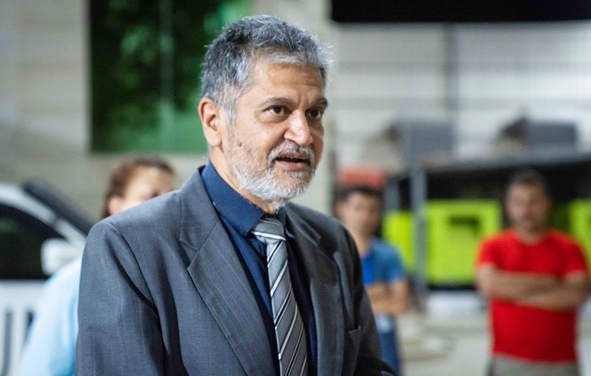ALEXANDRIA: Yemen’s warring factions have been urged by a top UN official to “silence the guns” and adhere to their previous obligations to fully implement the Hodeidah Agreement.
The head of the UN Mission to Support the Hodeidah Agreement and chair of the Redeployment Coordination Committee, Abhijit Guha, said the agreement had greatly reduced violence and civilian casualties in Hodeidah during the last three years, despite daily reports about sporadic fighting and shelling between government forces and the Houthis.
“The most important message I have is to urge the parties to the conflict to redouble their efforts to implement their commitments under the Hodeidah Agreement in good faith,” he told Arab News.
The UN Security Council approved establishing the UNMHA and RCC in Jan. 2019. It came a month after the warring parties had signed the Stockholm Agreement. This deal has three components - the Prisoner Exchange Agreement, the Taiz Agreement and the Hodeidah Agreement.

UNMHA Head of Mission Lt. Gen. Abhijit Guha during a meeting of the Redeployment Coordination Committee in December 2019. (UNMHA)
UNMHA was assigned to monitor a Hodeidah-wide truce, the redeployment of forces from flashpoints in the city of Hodeidah and seaports, the demining process, and report to the UN Security Council about progress on the ground.
BACKGROUND
UNMHA was assigned to monitor a Hodeidah-wide truce, the redeployment of forces from flashpoints in the city of Hodeidah and seaports, the demining process, and report to the UN Security Council about progress on the ground.
It is pressing the Yemeni parties to implement the Hodeidah Agreement. Ceasefire violations had dropped and Hodeidah seaports had seen a boom in ship movement over the last three years, Guha said.
“Ceasefire violations are down overall and economic activities, including in the ports, have increased overall since the signing of the agreement.”
The mission’s figures show that the average monthly civilian deaths in 2018 numbered 77 and the average monthly injuries numbered 93.
This year, those monthly averages were seven and 16.
The number of violent incidents peaked at 3,469 in March 2019, while there were just 92 violent incidents in the last month on record in July 2021.
Under the Stockholm Agreement, the Yemeni government, whose forces reached the edges of Hodeidah in late 2018, stopped its offensive as the Houthis agreed to pull out of the city’s main seaports and deposit state revenues into the central bank’s branch in the city.
The government accused the Houthis of violating the agreement by handing over security at the city’s seaports to allied forces and looting billions of riyals from the central bank’s branch.

UNMHA Head of Mission Lt. Gen. Abhijit Guha during a meeting of the Redeployment Coordination Committee in December 2019. (UNMHA)
Guha, who avoided naming violators, agreed that the redeployment of forces was not fully implemented.
“Under this agreement, it was envisaged that redeployment would occur in multiple phases. Unfortunately, these phases have faced obstacles, which has hampered progress on implementation. As for who is in charge of the three Hodeidah ports, this is not a question for the mission as it does not control these ports. The redeployment of forces as stipulated by the agreement remains outstanding, which is the most important obstacle to delivering on the pledges made in Stockholm.”
Another obstacle to the implementation of the agreement occurred last year, when the government boycotted the redeployment committee after a Houthi sniper gunned down a government liaison officer.
The UN official described the shooting as “an unfortunate incident” that disrupted the agreement from being executed.
“Since the suspension, the mission has been actively seeking to bring the parties back together to revive the joint mechanisms and support them to fulfill the terms as outlined in the Hodeidah Agreement.”
The government has repeatedly demanded that UNMHA move its main office from the Houthi-controlled parts of Hodeidah city to a neutral area, noting that the Houthis had “taken the mission hostage” thereby restricting its movements.
Guha said that the mission’s current location was not permanent.
“Since its deployment, the mission’s locations have been temporary. We have held discussions with both sides to find an operationally suitable location that gives access to both, as has been stressed by the (UN) Security Council in its last resolution.”
When the Houthis resumed their offensive on the central city of Marib, the government came under huge public pressure to reactivate its halted operation on Hodeidah city to relieve pressure on its forces in Marib.
Guha advised the warring parties to avoid escalation and to consider alleviating people’s suffering, arguing that the Hodeidah Agreement had averted a major humanitarian disaster that could have struck the whole of Yemen had the government pressed ahead with the offensive on the city as most of the country’s humanitarian assistance and goods came through Hodeidah.
“Minimizing the trauma of the civilian population should remain the guiding principle of all parties. As detailed earlier, the Hodeidah Agreement has had a significant real-world impact, decreasing civilian impact, reducing violence in the governorate, and ensuring continued operationalization of Hodeidah’s ports to enable the delivery of humanitarian aid.”
Guha demanded the government and the Houthis comply with peace efforts, stop fighting and pave the way for a political settlement to end the war.
“It is vital that both parties resume dialogue, silence the guns and look to a political solution that can create conditions for a prosperous and peaceful future for all people of Yemen. Civilian casualties must stop and the welfare of the Yemeni people be put first. Now is the time for peace.”


























